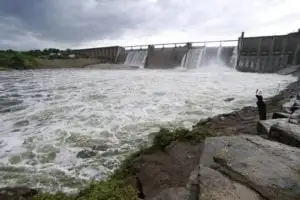Texas Water Rights By R Scott Alagood



According to the Texas Water Development Board (“TWDB”), Texas’ population is expected to increase from approximately 29.5 million to 51 million between 2020 and 2070. Tex. Water Dev. Bd., 2017 State Water Plan (May 19, 2016). It is further projected that over half of the population growth in Texas during this period will take place in the Dallas-Fort Worth metroplex and the cities and counties surrounding Houston. Id. During that same period, it is expected that the demand for water is expected to increase from 18.4 million to 21.6 million acre-feet per year. Id. “Acre-feet” is one way to measure the volume of water. One acre-foot of water is equal to the amount of water covering one acre of land one foot deep. An acre-foot of water is approximately 326,000 gallons of water. It goes without saying that Texans can’t live or work without an adequate supply of water. The regulation of water rights in Texas is evolving to meet these future needs.
Historically, water rights in Texas have had limited regulation. Water is generally divided into two category types: Surface Water and Groundwater. Surface water constitutes the ordinary flow, underflow, and tides of all flowing rivers, natural streams and lakes, and bays or arms of the Gulf of Mexico, and includes storm water, floodwater, and rainwater in all state rivers, natural streams, canyons, ravines, depressions, and watersheds. The right to use the surface water generally belongs to the state. An exception exists where surface water impounds on the surface of an owner’s tract and does not pass into a natural watercourse. A natural watercourse will have a defined bank and bed, a current of water, and a permanent source of water supply. However, the band and bed need not be deep, nor does it always have to flow. Clear examples of surface waters owned by the state include reservoirs (Lake Lewisville and Lake Ray Roberts), rivers (Trinity, Red, and Brazos), and streams or creeks (Clear and Pecan).
As opposed to surface water, Groundwater is owned by the surface owner of the land under which the water is located and may generally be used by such owner. Groundwater is the water which percolates below the surface of the earth. Groundwater may also be found in the form of a spring or an artesian well. Groundwater rights may be severed from the ownership of the surface estate and conveyed in the same manner as the mineral estate. Groundwater rights do not constitute any portion of the mineral estate. A reservation of “all of the oil, gas and other minerals” does not include the groundwater underlying the same applicable land. However, the mineral owner may use a reasonable amount of the groundwater underlying the land for the production of minerals.
There are other restrictions on the use of groundwater. For instance, one owner may not waste or maliciously cause the subsidence of the groundwater existing under multiple tracts of land. Such use may be further restricted by the rules of the Texas Commission on Environmental Quality, an established groundwater conservation district, or by location within a municipality or utility district holding a certificate of convenience and necessity (“CCN”) to supply water to the residents within the certificated area. If a parcel is located within a groundwater conservation district, the land owner may need to procure a permit before drilling a water well. If a parcel is located with a particular CCN, the owner may need to obtain the consent of the certificate holder before utilizing the water under its land.
It is expected that future regulation of water in Texas will expand due to the increase in population, the limited supply of water, and the increasing uncertainty of weather patterns. Accordingly, Texas has been divided into 16 regional water planning areas. Each planning area is comprised of groups which average approximately 23 members. Each of these group members represent different segments of the Texas population, including members of the public, counties, cities, industries, agriculture, environment, small business, utilities, river authorities, water districts, and groundwater management areas. Each regional planning group assesses and evaluates the needs and impacts of water availability and use in their areas. The TWDB and the planning groups then recommend several water management strategies to increase water supply, reduce water demand, or some combination of both. These strategies include conservation, new reservoirs, groundwater wells, water reuse, and desalination plants. In order to implement these strategies, it is reasonable to anticipate that more regulation of water rights will be necessary.
Scott Alagood is board certified in Commercial and Residential Real Estate Law by the Texas Board of Specialization and can be reached at [email protected] or www.dentonlaw.com.

